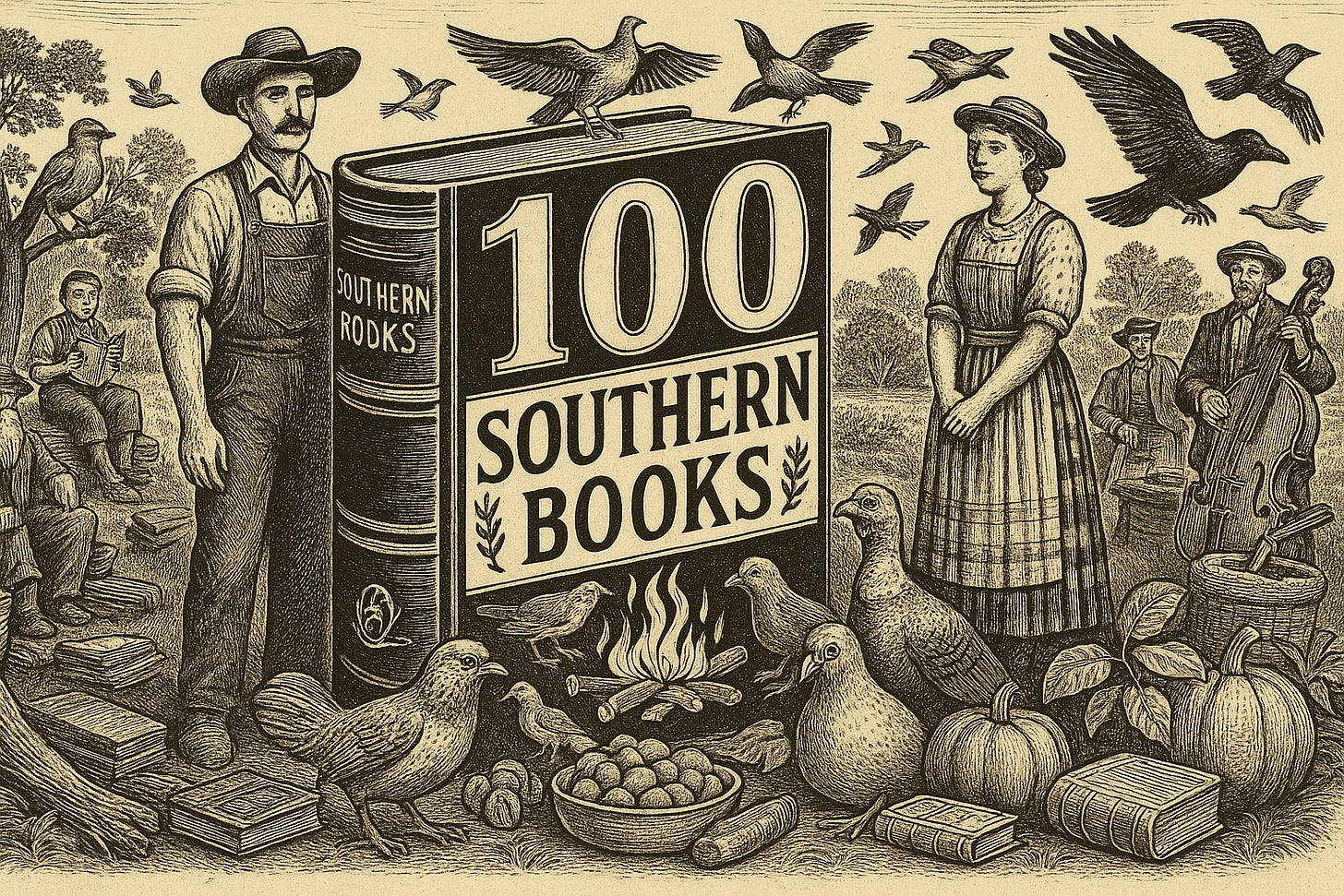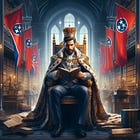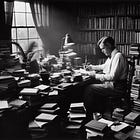One Hundred Famous Southern Books
Recommended Reading #7
The following appeared in the South Atlantic Bulletin 8.1, 1947, published by the South Atlantic Modern Language Association.
Here are a hundred famous Southern books. They are perhaps not the hundred best books; that would be a very large order. But they are books that have had a wide influence in transmitting the history, traditions, ideas and ideals, the landscape, human character, and local color of the South, in all its regions and all its eras, to the rest of the world and to succeeding generations.
Most of the books are by Southern authors and are marked by both authenticity and sympathy. But neither Chateaubriand nor Mrs. Stowe were Southerners, and the masterpiece of the one is as much lacking in authenticity as that of the other is lacking in sympathy, although both books have contributed to the literary tradition.
That tradition is not so simple as it has sometimes been made to appear; on the contrary, it is rather complex. Even this selection of titles is not large enough to include all the data by which the South must be interpreted. But one hundred is a good round number, and if it were doubled, the sum of evidence might still be found incomplete. Every effort has been made to achieve a representative selection.
Here are books that have been praised to neglect and books that have been damned to fame; most of all, here are books that flow in the very bloodstream of Southern life. Old books have been chosen, it is hoped, with mere antiquarian zeal held somewhat in check; younger books have been included without too rigorous an application of the canons of pure literary criticism.
Some Southern authors have not much employed Southern themes in their writings, and they will be missed–all but Edgar Allan Poe, who could not be omitted. Besides the large choice of belles-lettres, what we now call creative literature, there are a number of historical source-writings of the first order. A few secondary works are included, but most of them have already been accepted as classics of their kinds, and the others have obvious summary values.
Whatever minor merits lists may possess, their major service is to promote critical arguments. This list should stir up several lively ones, and the compiler is open to conviction that his choices may be bettered. - Thomas H. English, Emory University.
1. The Gentleman of Elvas. True Relation of the Hardships Suffered by Governor Fernando de Soto ... during the Discovery of the Province of Florida. 1557.
2. Captain John Smith. The General History of Virginia. 1624.
3. William Byrd. The History of the Dividing Line. 1728.
4. John Filson. Discovery, Settlement, and Present State of Kentucke. 1784.
5. Thomas Jefferson. Notes on the State of Virginia. 1787.
6. William Bartram. Travels through North and South Carolina, Georgia, East and West Florida. 1791.
7. Mason Locke Weems. A History of the Life and Death, Virtues and Exploits, of General George Washington. 1800.
8.François-René de Chateaubriand. Atala. 1801.
9. William Wirt. Letters of the British Spy. 1803.
10. Mason Locke Weems. The Life of Gen. Francis Marion. 1809.
11. William Wirt. Sketches of the Life and Character of Patrick Henry. 1817.
12. Edward Coote Pinkney. Poems. 1825.
13. John Pendleton Kennedy. Swallow Barn. 1832.
14. William Alexander Caruthers. The Kentuckian in New York. 1834.
15. David Crockett. A Narrative of the Life of David Crockett. 1834.
16. John Pendleton Kennedy. Horse-shoe Robinson. 1835.
17. August Baldwin Longstreet. Georgia Scenes. 1835.
18. William Gilmore Simms. The Yemassee. 1835.
19. William Gilmore Simms. The Partisan. 1835.
20. Nathaniel Beverly Tucker. The Partisan Leader. 1836.
21. Robert Montgomery Bird. Nick of the Woods. 1837.
22. Edgar Allan Poe. Tales.
23. Edgar Allan Poe. Poems.
24. William Tappan Thompson. Major Jones's Courtship. 1843.
25. Johnson Jones Hooper. Some Adventures of Captain Simon Suggs. 1846.
26. John Caldwell Calhoun. A Disquisition on Government. 1851.
27. Thomas Holley Chivers. Eonchs of Ruby. A Gift of Love. 1851.
28. Francis Robert Goulding. The Young Marooners on the Florida Coast. 1852.
29. Harriet Beecher Stowe. Uncle Tom's Cabin. 1852.
30. Joseph Glover Baldwin. The Flush Times of Alabama and Mississippi. 1853.
31. John Esten Cooke. The Virginia Comedians. 1854.
32. William J. Grayson. The Hireling and Slave. 1854.
33. Hinton Rowan Helper. The Impending Crisis of the South. 1857.
34. Frances Anne Kemble. A Journal of a Residence on a Georgian Plantation in 1838-1839. 1863.
35. John Esten Cooke. Surry of Eagle's Nest. 1866.
36. Augusta Jane Evans. St. Elmo. 1866.
37. Charles Gayarré. History of Louisiana. 1866.
38. Alexander H. Stephens. A Constitutional View of the Late War between the States. 1868.
39. George Washington Cable. Old Creole Days. 1879.
40. Abram Joseph Ryan. Father Ryan's Poems. 1879.
41. Albion W. Tourgee. A Fool's Errand. 1879.
42. George Washington Cable. The Grandissimes. 1880.
43. Joel Chandler Harris. Uncle Remus, His Songs and His Sayings. 1880.
44. Paul Hamilton Hayne. Poems. 1882.
45. Mrs. Louise Pyrnelle. Diddie, Dumps, and Tot. 1882.
46. Samuel L. Clemens ("Mark Twain"). The Adventures of Huckleberry Finn. 1884.
47. Mary Noailles Murfree ("Charles Egbert Craddock"). In the Tennessee Mountains. 1884.
48. Mary Noailles Murfree. The Prophet of the Great Smoky Mountains, 1885.
49. Thomas Nelson Page. In Ole Virginia. 1887.
50. Mrs. Susan Dabney Smedes. Memorials of a Southern Planter. 1887.
51. Irwin Russell. Poems. 1888.
52. Francis Hopkinson Smith. Colonel Carter of Cartersville. 1891.
53. James Lane Allen. A Kentucky Cardinal. 1894.
54. Kate Chopin. Bayou Folk. 1898.
55. Thomas Nelson Page. Red Rock. 1898.
56. Joel Chandler Harris. Chronicles of Aunt Minervy Ann. 1899.
57. Henry Timrod. Poems. 1899.
58. Philip Vickers Fithian. Journal and Letters, 1767-1774. 1900.
59. Mary Johnston. To Have and To Hold. 1900.
60. Booker T. Washington. Up from Slavery. 1901.
61. Mary Boykin Chesnut. A Diary from Dixie. 1905.
62. Thomas Dixon. The Clansman. 1905.
63. Corra Harris. A Circuit Rider's Wife. 1910.
64. Mary Johnston. The Long Roll. 1911.
65. James Branch Cabell. The Rivet in Grandfather's Neck. 1915.
66. Irvin S. Cobb. Old Judge Priest. 1915.
67. Sidney Lanier. Poems, Edited by His Wife. 1916.
68. William E. Dodd. The Cotton Kingdom. 1919.
69. Mrs. Elizabeth Pringle. Chronicles of Chicora Wood. 1922.
70. Hatcher Hughes. Hell-Bent fer Heaven. 1923.
71. James Boyd. Drums. 1925.
72. Ellen Glasgow. Barren Ground. 1925.
73. Du Bose Heyward. Porgy. 1925.
74. James Weldon Johnson. The Book of American Negro Spirituals. 1925.
75. Ellen Glasgow. The Romantic Comedians. 1926.
76. Edwin Mims. The Advancing South. 1926.
77. Hervey Allen. Israfel: The Life and Times of Edgar Allen Poe. 1927.
78. Paul Green. The Field God and In Abraham's Bosom. 1927.
79. Julia Peterkin. Scarlet Sister Mary. 1928.
80. Stephen Vincent Benet. John Brown's Body. 1929.
81. Claude G. Bowers. The Tragic Era-The Revolution after Lincoln. 1929.
82. Marquis James. The Raven: A Biography of Sam Houston. 1929.
83. Ulrich Bonnell Phillips. Life and Labor in the Old South. 1929.
84. Thomas Wolfe. Look Homeward, Angel. 1929.
85. Marc Connelly. The Green Pastures. 1930.
86. William Faulkner. As I Lay Dying. 1930.
87. I'll Take My Stand: The South and the Agrarian Tradition. By Twelve Southerners. 1930.
88. Elizabeth Madox Roberts. The Great Meadow. 1930.
89. Roark Bradford. John Henry. 1931.
90. T. S. Stribling. The Forge. 1931.
91. Erskine Caldwell. Tobacco Road. 1932.
92. Douglas Southall Freeman. R. E. Lee. 1934.
93. Stark Young. So Red the Rose. 1934.
94. Robert Selph Henry. The Story of the Confederacy. 1936.
95. Margaret Mitchell. Gone with the Wind. 1936.
96. Howard W. Odum. Southern Regions of the United States. 1936.
97. Jonathan Daniels. A Southerner Discovers the South. 1938.
98. Marquis James. The Life of Andrew Jackson. 1938.
99. Marjorie Kinnan Rawlings. The Yearling. 1938.
100. William Byrd. Secret Diary, 1709-1712. 1941.
Other Lists:











Moviegoer
Confederacy of Dunces
The Old Man (Faulkner)
The Violent Bear it Away
4-starters....
Had never heard of Mary Noailles Murfree before. Will read.